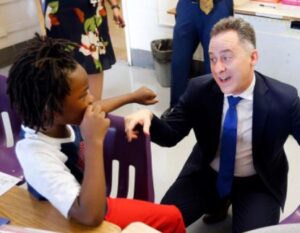by James A. Bacon
The Richmond Public School System is facing a teacher shortage after 25% of the system’s teaching staff resigned at the end of the 2021-22 school year. RPS is trying to fill 176 positions before the school year starts in August, reports WRIC television.
RPS has formed a teacher retention task force and is partnering with teacher residency programs at Virginia Commonwealth University and Virginia State University, Superintendent Jason Kamras told the School Board Monday.
Kamras proposed offering incentives worth up to $10,000 for new teachers, including $6,000 for relocation expenses and another $4,000 for teachers filling critical shortage fields. The money for incentives and recruiting would come from the federal stimulus fund. If the shortage is not resolved when the school year starts in August, said WRIC, the school will hire substitutes, deploy staff not currently assigned classrooms and adjust class sizes.
“We need to create incentives to keep and track experienced teachers,” Kamras said Monday night. “We are in a moment that requires extraordinary steps to meet extraordinary circumstances. That’s why I am moving forward with these incentives to help close the gaps over these next few weeks.”
Bacon’s bottom line: When 25% of your teachers resign in one year, you’ve got a serious problem. Resignations are high across the state, but that 25% figure might be unprecedented. Throwing huge wads of money at the problem might address the shortage this year, but that strategy is good only as long as the federal stimulus funds last.
Of Kamras’ ideas, redeploying administrative staff to teaching positions sounds like the best one. Fewer administrators, more teachers — a win-win proposition!
Like all Virginia schools, Richmond has been chronically short of teachers this time of year. This is not a new problem. It’s just gotten worse. In a functional school system, superintendents would seek to address underlying problems by asking why teachers are deserting in droves. Is the problem pay or working conditions? Repeated surveys indicate that teachers are most frustrated by the latter. What specifically frustrates them, and can the unhappiness be addressed?
Here is the problem with Richmond and many other Virginia school systems: superintendents, school boards and teachers unions are captive to a left-wing paradigm for how the world works. Above all things, they blame “systemic racism” for what ails the schools, even now, after years of implementing “anti-racist” policies. Besides that evergreen explanation, they have two new things to blame: the disruptions caused by COVID and right-wing activist parents inserting themselves into school curricula and badgering teachers.
Of course, Kamras and his ideological ilk were the ones who insisted that the schools switch to remote learning, so they should be held accountable for that. As for disruptive conservative parents, they aren’t much in evidence in Richmond. City voters went 77% for Terry McAuliffe last year, and I doubt that many among the 23% who favored Glenn Youngkin have kids in Richmond public schools. In any case, conservative agitators have been notable by their absence in Richmond school board meetings.
Although I have seen no school-by-school breakdown of the teacher shortages, anecdotal evidence suggests that teacher resignations are highest in high-poverty schools. Teachers are weary of the breakdown in order (some fear for their physical safety), they’re frustrated by the unwillingness of many children to learn, they’re dismayed by the widespread practice of social promotion, they’re discouraged by their interaction with parents, they are restive under administrators who think the way to foster learning is to micro-manage them and demand more paperwork, they don’t feel the administration has their backs in disputes with students and parents, and they’re generally burned out from overwork.
Rather than addressing these real problems, school boards around Virginia have focused on implementing “progressive” ideologies on matters of race and gender. Drawing from news headlines just today: conservative Hanover County is building “no gender” bathrooms in its new John M. Gandy elementary School, and in conservative Bedford County, parents are roiling over a planned drag-show performance at Jefferson Forest High School. The left blames conservative parents for creating the controversies, but there can be no denying where these cultural “innovations” originate — not from the parents.
Meanwhile, as attention focuses on these cultural effluvia, academic performance continues its sickening plunge. We’ll see the full extent of the damage in August when the Virginia Department of Education publishes the results of the Standards of Learning (SOL) exams from this spring.



